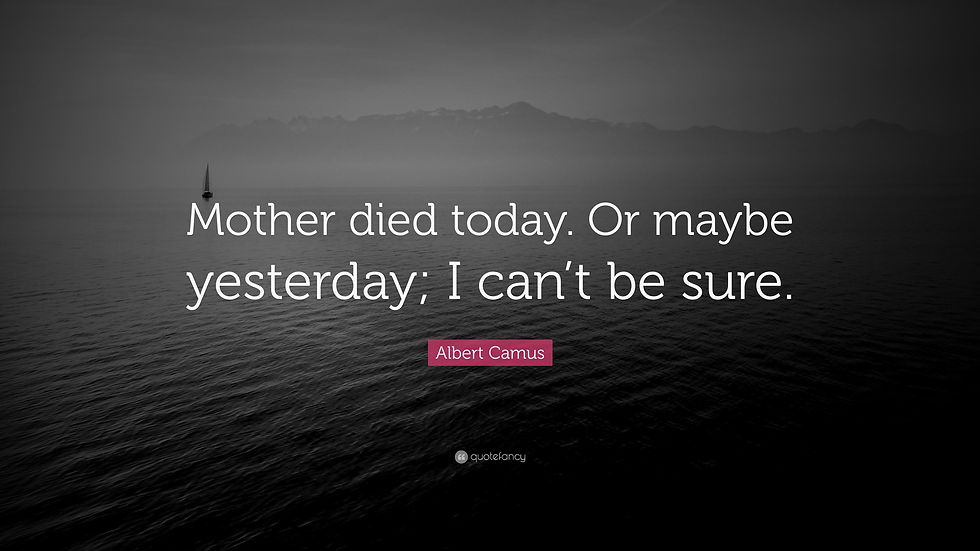Book Review- The Stranger (L'Étranger) by Albert Camus *SPOILER WARNING*
- Pinar Ari

- Jan 17, 2025
- 4 min read
Updated: Mar 23, 2025

"If something is going to happen to me, I want to be there. It was as if that great rush of anger had washed me clean, emptied me of hope, and, gazing up at the dark sky spangled with its signs and stars, for the first time, the first, I laid my heart open to the benign indifference of the universe." - Albert Camus, The Stranger
Ever thought of what its like to be estranged from yourself? This theme of alienation is frequently hinted in Albert Camus' The Stranger (1942), as well as his philosophy of absurdism. Camus uses the protagonist of the novel, Meursault to represent self-estrangement in a fictional setting taking place in Algiers, French Algeria. Meursault is indifferent, as evident from the beginning of the book— the death of his mother is mentioned, and he does not show signs of grief.

"The Arab"
The true nature of Meursault's psyche becomes more apparent when his neighbor, Raymond, suspects his mistress of infidelity and seeks revenge by provoking her brother. The mistresses' brother is consistently referred to as "The Arab" as a way to reduce him to his ethnic group. Throughout the novel, Raymond depicts "The Arab" as a villain despite his only crime being the mistresses' brother. The tense environment in this setting is a representation of the colonial and racist dynamics toward the marginalized people of French-occupied Algeria during the early 20th century.
The Murder
There is not a thought behind Meursault's eyes as he kills "The Arab" and does not show remorse. To the core, he is existentially detached, and indeed when he is tried for the murder, he could not care less. But deep within that murder, Camus reinstalled absurdism as seen by his writing describing the shooting, "Every nerve in my body was a steel spring, and my grip closed on the revolver. The trigger gave, and the smooth underbelly of the butt jogged my palm. And so, with that crisp, whipcrack sound, it all began...I knew I'd shattered the balance of the day, the spacious calm of this beach on which I had been happy. But I fired four shots more into the inert body, on which they left no visible trace. And each successive shot was another loud, fateful rap on the door of my undoing.". What an odd way to describe a murder scene... Meursault does not think of moral rational justification and instead, shoots the man multiple times. The part where he refers to the balance of the day and spacious calm of the beach emphasizes how Meursault ruined the tranquility of the setting and evokes unnerving feelings in the reader as it had the potential to be a wonderful day. The way it is described a disconnect from social norms and is a representation of the shooters alienation, individuals like him struggle to find meaning in their actions because they believe the universe offers none.
Furthermore, Meursault measured the meaning through certainty. According to him, death was the only certainty and therefore he believed that life had no inherent meaning (oliSUNvia on YouTube).
Meursault's atheism
One of the most dramatic depictions of absurdism philosophy is when Meursault's magistrate goes hysterical after questioning his client's beliefs and feelings. He is first interrogated about the death of his mother to which he responds, "I'd rather lost the habit of nothing my feelings, and hardly knew what to answer. I could truthfully say I'd been quite fond of Mother— but really that didn't mean much. All normal people, I added as an afterthought, had more or less desired the death of those they loved, at some time or another." This indifference is met with judgment as the magistrate was calmly dissatisfied by this response and told Meursault, "You must promise me to not say anything of that sort at the trial or to the examining magistrate." But all goes south after the conversation gets theological. His magistrate feels deeply offended after he realizes that his client is a disbeliever. The reason for the mad reaction was Meursault's lack of faith, making the magistrate believe that their views do not align and he is beyond redemption especially in court but outside of the trial as well. The sequencing of the novel is strange and makes evident the true nature of absurdism's personification as Meursault who's existential detachment is contrasted to societal and religious expectations.
Final thoughts
Despite being a short novel, the pacing was slow at times and could be unenjoyable for those who do not appreciate philosophy. However, the timeline was magnificent as readers were not directly bombarded with Meursault's psychology and instead are forced to piece together the random flashbacks themselves while making deeper connections. Camus' descriptions are difficult to get bored of as he has a unique writing style and his long narrations remind me of Leo Tolstoy's Anna Karenina. While the reader is immersed in the novel, it feels as though they are in the place where the events are taking place. The philosophical aspect of the book was not difficult to understand as it was more straightforward than other philosophers such as Dostoevsky, Heidegger, and Hegel. If anyone is trying to step their toes little by little into the philosophy book pool then The Stranger is a good starting point.
Source used for a little example:




Comments